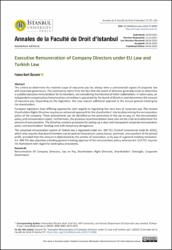Please use this identifier to cite or link to this item:
https://hdl.handle.net/20.500.11779/2004| Title: | Executive Remuneration of Company Directors Under Eu Law and Turkish Law | Authors: | Özcanlı, Fatma Beril | Keywords: | Corporate governance Shareholders right directive Shareholders' oversight Say on pay Remuneration of company directors |
Publisher: | Istanbul University Press | Source: | ÖZCANLI, F. B. (2023, May). Executive Remuneration of Company Directors under EU Law and Turkish Law. In Annales de la Faculté de Droit d’Istanbul (No. 72, pp. 97-126). Istanbul University. | Abstract: | The criteria to determine the material scope of executive pay has always been a controversial aspect of corporate law and corporate governance. The controversy stems from the fact that the board of directors generally tends to determine a suitable executive remuneration for its members, not considering the interests of other stakeholders. In some cases, an independent compensation/remuneration committee is appointed by the board of directors and determines the amount of executive pay. Depending on the legislation, this may require additional approval at the annual general meeting by the shareholders. European legislators have differing approaches with regards to regulating this very area of corporate pay. The revised Shareholders Rights Directive requires an enhanced approach for the shareholders' role by determining the remuneration policy of the company. These amendments can be identified as the promotion of the say on pay, on the remuneration policy, and remuneration report. Furthermore, the previous recommendations have also set the criteria to determine the amount of remuneration. The Directive contains provisions for setting up a clear and transparent corporate remuneration policy and shareholders' binding vote with temporary derogations. The corporate remuneration system of Turkish law is legislated under Art. 394 TCC (Turkish Commercial Code Nr. 6102), which only requires that board members can be paid an honorarium, salary, bonus, premium, and a portion of the annual profit, provided that this amount is determined by the articles of association, or by way of a general meeting resolution. Art. 408 TCC also stipulates a binding general meeting approval of the remuneration policy, whereas Art. 513 TCC requires the framework with regard to bankruptcy procedures. © 2023 Istanbul University Press. All rights reserved. | URI: | https://hdl.handle.net/20.500.11779/2004 https://doi.org/10.26650/annales.2023.72.0006 |
ISSN: | 0578-9745 |
| Appears in Collections: | Hukuk Fakültesi Koleksiyonu Scopus İndeksli Yayınlar Koleksiyonu / Scopus Indexed Publications Collection |
Files in This Item:
| File | Description | Size | Format | |
|---|---|---|---|---|
| 73C3217C5D09432FBEE9A12F0544FEB9.pdf | Full Text- Article | 625.32 kB | Adobe PDF |  View/Open |
CORE Recommender
Page view(s)
42
checked on Jan 13, 2025
Download(s)
22
checked on Jan 13, 2025
Google ScholarTM
Check
Altmetric
Items in GCRIS Repository are protected by copyright, with all rights reserved, unless otherwise indicated.